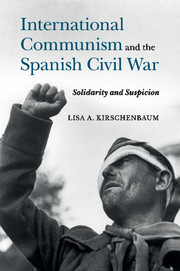Description
International Communism and the Spanish Civil War
Solidarity and Suspicion
Author: Kirschenbaum Lisa A.
This book provides an intimate picture of international communism during the Spanish Civil War.
Language: English
Subject for International Communism and the Spanish Civil War:
Approximative price 32.87 €
In Print (Delivery period: 14 days).
Add to cart
International Communism and the Spanish Civil War
Publication date: 01-2018
Support: Print on demand
Publication date: 01-2018
Support: Print on demand
Approximative price 103.04 €
In Print (Delivery period: 14 days).
Add to cart
International Communism and the Spanish Civil War
Publication date: 07-2015
287 p. · 16x23.5 cm · Hardback
Publication date: 07-2015
287 p. · 16x23.5 cm · Hardback
Description
/li>Contents
/li>Biography
/li>
International Communism and the Spanish Civil War provides an intimate picture of international communism in the Stalin era. Exploring the transnational exchanges that occurred in Soviet-structured spaces - from clandestine schools for training international revolutionaries in Moscow to the International Brigades in Spain - the book uncovers complex webs of interaction, at once personal and political, that linked international communists to one another and the Soviet Union. The Spanish Civil War, which coincided with the great purges in the Soviet Union, stands at the center of this grassroots history. For many international communists, the war came to define both their life histories and political commitments. In telling their individual stories, the book calls attention to a central paradox of Stalinism - the simultaneous celebration and suspicion of transnational interactions - and illuminates the appeal of a cause that promised solidarity even as it practiced terror.
Introduction: being communist; Part I. International Communists and the Soviet Union, 1930–6: 1. Learning to be Bolshevik; 2. Imagining, seeing, feeling the revolution; Part II. Being Bolshevik, Making History in Spain, 1936–9: 3. 'All advanced and progressive humanity'; 4. True Bolsheviks and Trotskyite bastards; 5. Best comrades, tough guys, and respectable communists; Part III. International Communists and the Memory of the Spanish Civil War, 1939–53: 6. From 'our war' to the great fatherland war; 7. The early Cold War and the fate of 'progressive humanity'; Epilogue: internationalism and the Spanish Civil War after Stalin.
Lisa A. Kirschenbaum is a Professor of History at West Chester University, Pennsylvania. She is the author of The Legacy of the Siege of Leningrad, 1941–1995: Myth, Memories, and Monuments (2006) and Small Comrades: Revolutionizing Childhood in Soviet Russia, 1917–1932 (2001). She is the recipient of a fellowship from the National Endowment for the Humanities and grants from the Kennan Institute for Advanced Russian Studies of the Woodrow Wilson Center and the International Research and Exchanges Board. She has published articles in the Slavic Review, European History Quarterly and Nationalities Papers, and has contributed to the Women's Review of Books.
© 2024 LAVOISIER S.A.S.
These books may interest you

The Cambridge History of Communism 170.88 €



